A Conversation With Bela Tarr (THE TURIN HORSE)
“Just remember,” grins Béla Tarr, on a hot November day in Los Angeles, “outside the sun is shining.” He’s pitying, comforting, and mocking his audience as they settle in for an AFI Fest screening of his final and most uncompromising film, The Turin Horse.
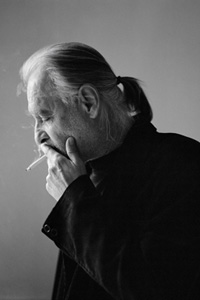 Tarr began directing films in the late 1970s, but his unique style of filmmaking, which tends to use long continuous takes with prodigious tracking shots, sparse dialogue, and deliberate pacing, first won international acclaim with his 1988 film Damnation. In 1994 he released his best-known film, the 7 hour, 15 minute Satantango. In all he has made nine feature films as well as numerous documentaries and shorts, and is considered one of the great masters of the seventh art.
Tarr began directing films in the late 1970s, but his unique style of filmmaking, which tends to use long continuous takes with prodigious tracking shots, sparse dialogue, and deliberate pacing, first won international acclaim with his 1988 film Damnation. In 1994 he released his best-known film, the 7 hour, 15 minute Satantango. In all he has made nine feature films as well as numerous documentaries and shorts, and is considered one of the great masters of the seventh art.
In The Turin Horse, Tarr pushes his vision to its extreme, chronicling six days in the lives of a father and daughter and their horse, in wintertime out in the bleak landscape of rural Hungary. It’s a film you can’t approach half-heartedly—if you’re not completely on board it’s a grueling endurance test, but give yourself over to the experience and you will witness a stunningly beautiful, bitterly nihilistic, slow-motion horror movie, with a subtle hint of gallows humor, in which forces of entropy slowly strip the main characters of everything they have.
The film unfolds, typically, in a series of extremely long, uncut takes, with infrequent, elegantly choreographed dolly moves instead of cuts. Tarr’s compositions are a thing to behold—powerful, eloquent, and evocative. The soundtrack shifts between ominous, repetitive organ music and shrieking wind. The sparse script is punctuated halfway through by a neighbor’s bitter monologue, a glorious piece of writing in which he blames both Man and God for a world left in ruins by forces of mediocrity: “…since they’ve acquired everything in a sneaky, underhanded fight, they’ve debased everything…. It’s been going on for centuries… yet only in one way, like a rat attacks from ambush… There shouldn’t be any struggle, just the sudden disappearance of one side, meaning the disappearance of the excellent, the great, the noble…”
In the Q&A, Tarr expresses his boredom with answering the same question over and over: his retirement from directing films, which he announced a year and a half ago, has threatened to overshadow his final film. Basically he feels that he’s said what he needed to say in film and he doesn’t want to repeat himself.
Tarr favors an elegantly disheveled look: plenty of scruffy stubble and a tangle of graying hair pulled back into a ponytail. We meet the next day in a makeshift space in the historic Roosevelt Hotel, overlooking the clash of half-baked redevelopment and ’60s-era tourist traps at the western end of Hollywood Blvd. His presence is a lot different one-on-one—the tart and rebellious swagger of his public speaking is pulled way back; his voice is now soft and warm, and there’s a surprising sweetness about him. Most remarkable are his eyes, deep-set and vibrant blue, glittering like little almond-shaped jewels.
Bela Tarr: Hammer to Nail. What is this—is a newspaper?
Hammer to Nail: It’s a website that’s primarily read and written by American independent filmmakers.
BT: Because the title is nice.
H2N: Thank you, thank you. I really loved your film, and your other films as well. First of all I wanted to ask you, in The Turin Horse, about the use of elements, how first the water dries up, then the fire goes out—was that a conscious thought?
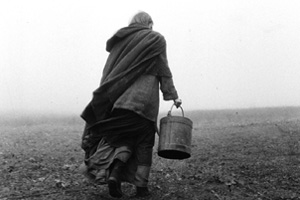 BT: It’s just a simple anti-creation story, you know? If you read the Bible you could see that God created the world in six days and he did something in every day. And we just take it away, the same things what we got from God.
BT: It’s just a simple anti-creation story, you know? If you read the Bible you could see that God created the world in six days and he did something in every day. And we just take it away, the same things what we got from God.
H2N: The film seemed very divorced from—it doesn’t seem engaged with current culture, or maybe it is in a more abstract way? And for American independent films right now I think a lot of people feel a necessity to somehow be engaged in what other people are doing or what’s going on even in popular culture, and I wonder how you feel about that.
BT: I have to tell you, you know, if you are a real filmmaker you have to have your own style, your own language. Which is depending on your cultural background, your history, and your budget of course, and a lot of things what you already have. Because as I see, what I think, filmmaking is a kind of reaction to the world—you’re just telling people how you see the world, from your point of view of course. But, you know, that’s the reason why I do not listen for the other circumstances, what the other people are doing—because it’s impossible to follow someone, impossible to say OK this is a trend, or what we would like to keep it or—it’s definitely fake, wrong way. You have to be yourself, you have to tell everything from your side and you do have to have your own language; and if you have your own language you don’t care about the world and anything really and that’s what I feel, what I learned during these 34 years.
H2N: But what about having a dialog with other filmmakers or trends?
BT: Of course we have a dialog and we know each other and we like and respect each other but we know well “this is his way and this is my way.” And of course I’m quite happy if I can see a new Jarmusch movie or if I can see the new movie of Gus or Atom Egoyan or Carlos Reygadas or—I can tell you some friends’ names, but we are in a different planet. We are in the same planet but in a different continent, a different—too much things are different.
H2N: This film has obviously—the look of it is very aesthetically pleasing with its black and white photography. I think some filmmakers have chosen to react against that and go against the idea of beauty. How do you make that choice?
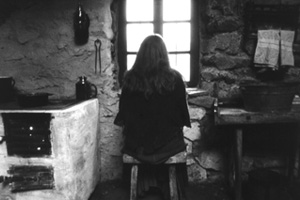 BT: I don’t know what is the beauty because, you know, when you see this movie it’s nothing beauty. The life what we are showing is not beauty. Maybe the way, how we are showing, it’s the way I see the world, you know? Some long takes and camera movements and black and white. This is something I like. And if you like something you have to do it. And that’s how I see and how I like to build up a scene or situation or the whole movie. It’s really, it’s just coming from me. I don’t know what is the beauty, really, it’s always a question mark, what is the beauty and what we say ugly. Because sometimes we say, we saw some people and we say they’re ugly and for me maybe they’re more beautiful than the people from the cover page of the Vanity Fair for example, you know?
BT: I don’t know what is the beauty because, you know, when you see this movie it’s nothing beauty. The life what we are showing is not beauty. Maybe the way, how we are showing, it’s the way I see the world, you know? Some long takes and camera movements and black and white. This is something I like. And if you like something you have to do it. And that’s how I see and how I like to build up a scene or situation or the whole movie. It’s really, it’s just coming from me. I don’t know what is the beauty, really, it’s always a question mark, what is the beauty and what we say ugly. Because sometimes we say, we saw some people and we say they’re ugly and for me maybe they’re more beautiful than the people from the cover page of the Vanity Fair for example, you know?
H2N: Some of your compositions seemed reminiscent of paintings. Are you inspired by certain artists?
BT: No, it’s—you could say yes, some references are there, but I have to tell you I learned more from the paintings and the other visual arts than from the movies. I got a lot of real, you know, when you see a good painting you could see a kind of perspective, you could see a kind of composition, you could see a lot of things, and when you do a movie like this where we are involving with nature, when we are involving the time and we are involving a lot of things which are usually not part of the movies, in this case you have to find the solution how you should show these things—and of course I like very much if something is composed clear, clean and precise, because this is how I am.
H2N: How did you work with your screenwriter [László Krasznahorkai]?
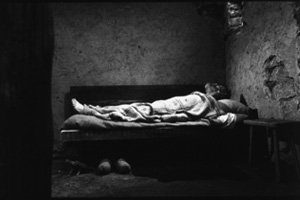 BT: You know, he is not a screenwriter, he is a writer, and he published novels and he is a very well known writer, not only in Hungary—you could read his books in English, you can have it I think in the next bookstore, and he is a really good writer. And the work, how we worked together it was a very simple thing because we have the same point of view. When we see something in the real life, you know, some situations, our reaction is the same. Of course he has a different language because he is writing—he has words, and we’re doing film and we have just pictures. Just two different languages and you cannot use the literature during the shooting because it’s not reasonable, but you can work with him to create the situation, to give intellectual placement for the whole, stuff which is absolutely important.
BT: You know, he is not a screenwriter, he is a writer, and he published novels and he is a very well known writer, not only in Hungary—you could read his books in English, you can have it I think in the next bookstore, and he is a really good writer. And the work, how we worked together it was a very simple thing because we have the same point of view. When we see something in the real life, you know, some situations, our reaction is the same. Of course he has a different language because he is writing—he has words, and we’re doing film and we have just pictures. Just two different languages and you cannot use the literature during the shooting because it’s not reasonable, but you can work with him to create the situation, to give intellectual placement for the whole, stuff which is absolutely important.
H2N: In this film were you thinking of the horse as a character the way you would a human character?
BT: Of course—a horse has a personality and the casting was nearly the same like how we do the human beings. When we are doing the casting we are listening always for the personality of our people and I never listen for the character of the movie. I don’t care about the character of the story—I’m just following my nose and I feel their personalities and I try to do real situations when they are just “being” and not “playing.” And that’s why I do very carefully the casting and maybe this is the reason why I like to work with the same people—because I know them and I know how they will react in a situation. And when we did the casting with the horse, of course we just needed a horse that doesn’t want to work, and we found her in an animal market in the countryside in Hungary close to the Romanian border. It was a very ugly, shitty, miserable animal market and she was the horse which never wants to work. That’s why I took her immediately, because that’s what we needed. If you don’t take her in this case maybe she’s just a piece of sausage now. But of course we saved her life and now she’s pregnant which is quite nice and we have a strong hope we will have some baby.
H2N: What about working with non-actors? How do you …
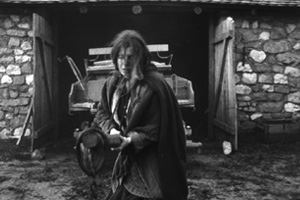 BT: As I told you, I’m just listening for the person. I don’t care if someone’s professional actor or non-professional. I don’t mind. One thing is sure: I want listening—they have to be. When I’m working with a professional person I do not let them “play,” and the same situation the non-professional.
BT: As I told you, I’m just listening for the person. I don’t care if someone’s professional actor or non-professional. I don’t mind. One thing is sure: I want listening—they have to be. When I’m working with a professional person I do not let them “play,” and the same situation the non-professional.
H2N: So how do you stop them from playing?
BT: It’s quite simple, it’s quite simple. I see their eyes. If I see on their eyes they are not in the situation, they’re just pretending, something in this case I stop immediately and I tell them OK, it’s nice, but for another movie, not in this.
H2N: I’m curious about your soundtrack, with the two elements of the piece of music and the sound of the wind—how did you choose to make it so minimal?
BT: Fortunately, you know, I’m working with the same composer [Mihály Vig] since 1983, which is such a long time, and he’s a very sensible and very clever guy and he’s a poet and he’s a rock musician and he does a lot of things and he knows what you like and, you know, when he just goes to the studio and takes the music, I do not go there and I do not bother them, you know, when they are working. I just let them, and he’s coming back with the music. And then, you know, in this case, in this movie it was quite simple because we just used these two elements, the wind—and some noises of course—and you know it’s just a question of the sound mix: sometimes you just disappear, sometimes we just used just only a few instruments from the music, sometimes everything, you know, it was a simple sound mix.
H2N: The thing I’m most curious about is the neighbor’s monologue, what he said in that monologue—I mean I think it speaks for itself, but the reaction of the man in the film is “Rubbish!” and I wonder if someone had said all that to you what would your reaction have been?
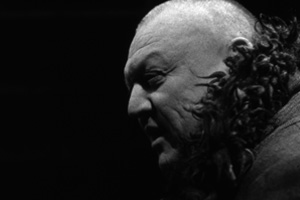 BT: No, you know it’s—if you go to the next bar and you could feel the people, and you can see how when they are drinking, or how they are telling their own monologues—this is just a point of view. This is someone’s monologue who just needs some spirit, he’s just coming and waiting for his bottle and during all this time he is talking talking talking talking, like someone in the next bar, you know, and that’s simple; nothing more, and of course the people are in the bar, and the alcoholic people they are talking always about serious things.
BT: No, you know it’s—if you go to the next bar and you could feel the people, and you can see how when they are drinking, or how they are telling their own monologues—this is just a point of view. This is someone’s monologue who just needs some spirit, he’s just coming and waiting for his bottle and during all this time he is talking talking talking talking, like someone in the next bar, you know, and that’s simple; nothing more, and of course the people are in the bar, and the alcoholic people they are talking always about serious things.
H2N: But he does make some interesting points.
BT: Ah it’s something that’s interesting of course—if he says we made everything dirty, if we touch something it becomes dirty, you know this is really something, but I do not want to judge, to tell you this is serious or not. It’s up to you.
H2N: He talks about things being bought and degraded over the centuries and I think maybe we have an idea today that the world is degraded compared to 100 or 1,000 or 10,000 years ago; do you agree with that idea?
BT: I don’t know how was the world. I know just this world, what we have now, and I know only one thing—this is our creation. If this world is shit that’s what we could do. If this world is beautiful that’s also what we could do. But I have to tell you when I am looking around I have a feeling this is a piece of shit. I cannot say this world is nice, beautiful, or working where there’s no humiliation and everybody respects each other, you know? And everybody’s listening for the other people or everybody just respects the other’s dignity, you know? As I see now this is what we definitely do not see and cannot need.
H2N: He also paraphrases the idea that God is dead, which…
BT: God is dead, we know well, since Nietzsche started the Zarathustra you could read very clearly that God is dead, and…. really.
H2N: What about, I thought it was interesting you had the gypsies coming in on white horses, because they seem to put a curse on these people, and…
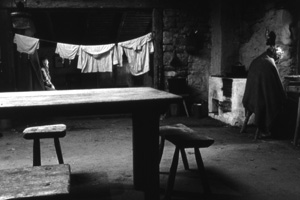 BT: The Gypsies have always beautiful horses, because they understand where are the horses, and what they have in service. If you go to Europe and you can see the Gypsies, if they have horses, they are surely the most beautiful horses. They are free. They are free. They are just coming and running away. You know?
BT: The Gypsies have always beautiful horses, because they understand where are the horses, and what they have in service. If you go to Europe and you can see the Gypsies, if they have horses, they are surely the most beautiful horses. They are free. They are free. They are just coming and running away. You know?
H2N: And it sort of created a contrast between their freedom and the protagonists…
BT: No, they are just coming—they are just coming. Or maybe they are escaping also from the storm or the wind. Or they know, they feel the end earlier than the other people. If you are free you can have it a little bit more than if you are locked or if you’re closed in a situation.
H2N: You’ve created this amazing body of work and I imagine you’ve had a great passion for making films for all of these years; I wonder what happens to that passion after making films.
BT: I don’t know really; that’s what I’m never thinking about. You know, if you are working with people you have to listen for them, you have to understand them, and of course if I want something from them, you know, I have to somehow—I have to convince them and somehow I—because if I’m just pushing them it will be dead, without life, without real emotions, without nothing, just a creation. That’s what I hate, but, you know, we just try to develop something that maybe was hidden or maybe they had no courage to show. You know, it’s—I don’t know what we call it, passion or not, or how we should say it—it’s just something which is coming and you have to listen, you have to listen or…?
H2N: What you think about how there are these two parallel worlds of art film and popular film and they seem like they’re moving farther and farther away from each other.
BT: That’s what I think it’s really, it’s not true. You know, the question is what you believe about people, how do you believe your audience, spectators. If you trust your spectators. Because I trust my audience and you know well they’re not kids, they’re adults—clever, sensible, intelligent people, and you have to do your best for them. Or the other version—I can say OK you are a stupid kid who just needs an ugly piece of fast food, just simple entertaining and just, just, you know—that’s what I hate, now the people are not like this. The people have more brain than these showbiz guys believe. If they do not respect the people, yes of course they can do this, but I don’t like this way.
H2N: Again for the readers of my publication—a lot of them are people that do want to make films that assume that audiences are intelligent and sensitive and yet there’s maybe more than ever such a barrier for serious filmmakers to be able to get access to distribution; do you have any thoughts?
BT: By the end is not difficult. I remember when I did my Satantango, this seven hour, fifteen minutes long movie, everybody said you are totally crazy, nobody wants to see this stupid movie, and I didn’t care, and you know what is happening? This movie is still running around the world since 16 years—and I do not remember the movies that were started and released at the same moment that we did this. I don’t remember that because you forget them; after two months they are finishing in the garbage and nobody remembers this because it’s just a simple stupid storytelling. If you have a real movie, the real movie, you can watch it 20 or 25 years later or 50 years later; the time will judge it, OK? And by the end now we have more audience than this stupid box office hit. Yeah, because you wait we could make the same amount of profit, but of course the timing is different. We don’t want to get the money within two months; we let the film live, just go, go, and screen, and it takes 15 years, but who cares? By the end we have the same amount of people, that’s 100% sure.
—Paul Sbrizzi








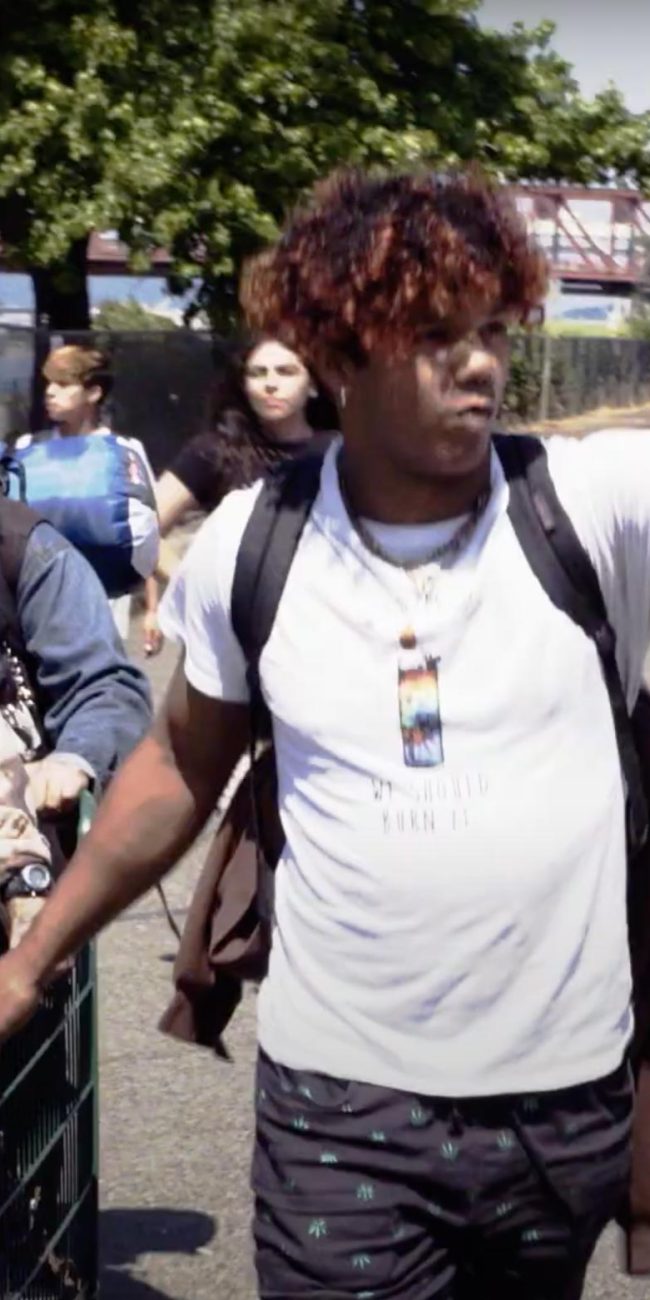
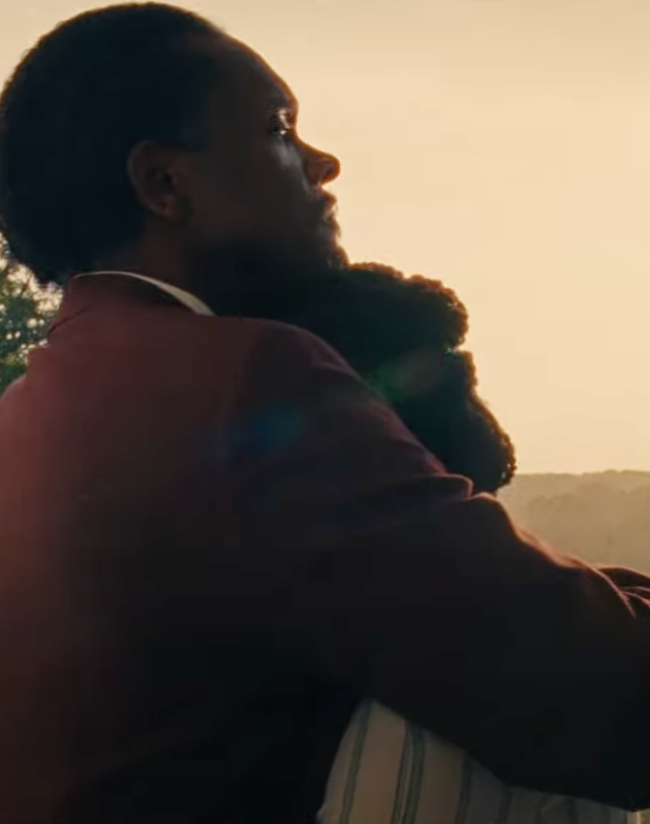


Bear
How can you not be inspired by this man?
Bear
How can you not be inspired by this man?